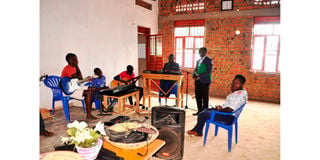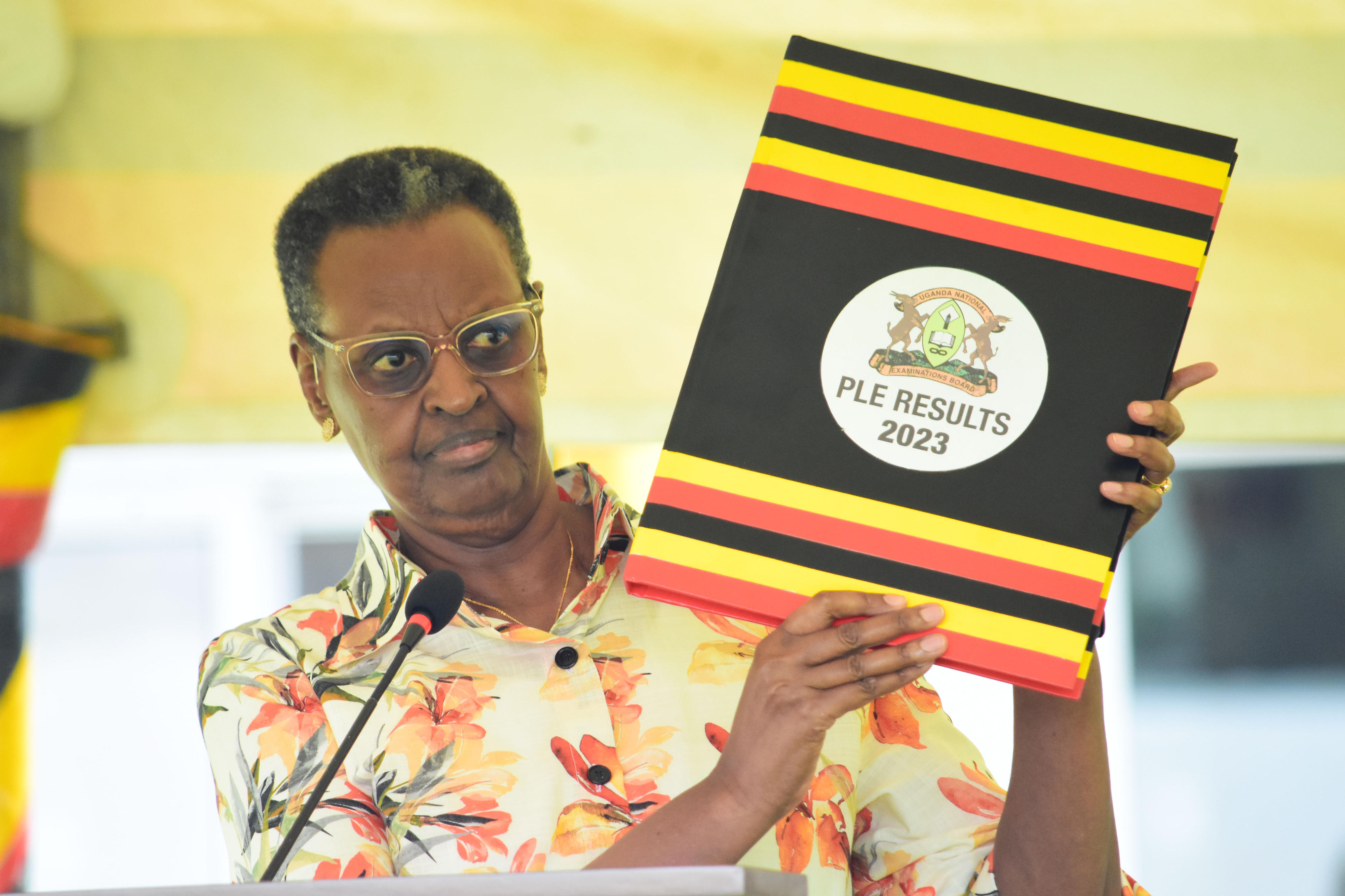Prime
One of the best schools avoided PLE for eight years

Some of the Uganda Kids Project Primary School pupils in Ntungamo engage in music practice during holidays. PHOTO | PEREZ RUMANZI
What you need to know:
- In one of the most remote parts of Ntungamo District of Ishunga village, Itojo Parish Ntungamo District sits Uganda Kids Project Primary School (UKP). Per average score, the school with 30 candidates in Primary Seven became the overall best in Uganda with an average score of aggregate 5.1
Uganda Kids Project (UKP) was established as a centre to manage and equip vulnerable children and their families with skills.
Today, UKP has morphed into a fully-fledged education institution taking over other services first established by the directors.
Uganda Kids Project Primary School is part of a bigger project that runs Calvary Chapel Ishunga and UKP community health centre as well as several agriculture demonstration gardens.
“We never planned to start a school. Our vision was to take care of the children who were brought to the project by people from the neighbourhood who could not afford a better life. But, during the time of care we thought of teaching them some literacy basics as we equipped them to become strong Christians,” Ms James Danyala, one of the school directors says.
However, as the children grew and read more, parents started demanding that their children get enrolled to school. It would be hard losing these children to schools whose systems they were uncertain of. The administration initiated a programme based on American syllabus but teaching the Ugandan curriculum.
“We started engaging them in the primary school curriculum, but with no aim of participating in PLE. Our aim was to equip them with life basics that they would use to survive anywhere in the world. This is still our dream,” Danyala shares.
Undertaking PLE
Three years ago, under conviction of parents, Uganda Kids project Primary School registered for PLE scoring 100 per cent in Division One. This was to be repeated the subsequent year. Then, the third year of examination saw them beat the whole country.
Nine pupils passed with aggregate Four, 11 with aggregate five, then seven with aggregate six, and three with aggregate seven. There were 30 pupils who sat PLE at the project school.
According to Uneb official results, with 5.1 average aggregate score per student, it was first followed by Yudesi Primary School in Nansana Municipality (5.5), Endinzi Parents in Isingiro District (5.6), and Mt Zion Kayabwe in Mpigi District (5.7).
More than 40 per cent of the pupils at the school hail from the rural poor, thus are paid for by the school. The directors, however encourage parents to contribute either in cash or in kind to activities at the school.
Starting out as a project for the vulnerable children in Mukono District 12 years ago, UKP migrated to Ntungamo in 2014 and started a primary school in 2015.
The school directors American Christian missionaries Pastor William Billy and Ms Danyala, say they only allowed the children to sit examinations as a measure to have the community accept them and appreciate their work.
“The community desire to have their children sit national exams compelled us to work it out. We are not in any competition, we are just showing parents that children can perform better,” Ms Danyala says.
Pastor Billy adds that they are not teaching to pass exams, but want to produce children who will compete effectively after school, not only in Uganda, but even outside the country.
“Such values make children the best. That is the reason we had not wanted to put emphasis on PLE,” he says.
The routine
With boarding and day school section, each class has their own time table. Primary Five to Primary Seven pupils are boarding scholars. A normal school day starts with breakfast at 6am after which the pupils go for assembly at 7am.
After the assembly, the pupils go to the chapel for prayers and classes begin at 8.30am. There is a one and a half hour break for break and lunch every day.
At 5pm, all classes break for evening assembly and then take a 30-minutes bathing break for all pupils before dinner is served at 7pm.
Pupils only go for a guided prep between 7.45pm and 9.15pm after which they retire until the next day’s breakfast.
“We do not have morning prep, popularly referred to as ‘winter’ here. Children must sleep enough and wake up to feed and pray. Sometimes over teaching and reading too much curriculum work destructs pupils. They must be equipped all through. The reason we have a full compulsory hour between 5pm and 6pm for physical education, games, sports and other extra and co- curricular activities,” Mr Chrispus Arinaitwe the head teacher says.
Reading is emphasised
Extra courses alongside the examinable English, Social Studies, Science and Mathematics, include carpentry, woodwork, building construction, gardening, debate, Bible study and chapel assemblies, music and drama. Every pupil from Primary One to Primary Seven has a quota for a number of books read with each supervised by a different teacher.
“Reading is core for any successful student, all pupils are encouraged to read different books from Primary One to Primary Seven. Reading helps a pupil comprehend questions in exams, but also understand the world they live in. They must read beyond the syllabus,” Mr Arinaitwe says.
In exams, the pupils are rated highly that for a pupil to score a Distinction One he must have scored 96 percent in an exam while a pupil with 59 percent is graded as Failure (F9). A pupil who scores an average of 75 percent in all exams passes with aggregate 24 may not be promoted to the next class or would be dropped to a lower class midterm.
“We encourage our pupils to do the best, but we also tell them they are still loved without Division One. There is no pressure for grades because our assessment is aimed at these pupils comprehending why they are in school. The exams are a measure of whether they have achieved and thank God they have showed that,” Ms Danyala notes.
Transition to secondary school
Because most of the pupils who pass through the primary school are vulnerable they did not perform well at the first exams. Others failed to find secondary school to go to because of financial constraints.
This forced the directors to start UKP Garden Secondary School that would accommodate the vulnerable students but also teach an extra skill to the students.
Thus, the school has stopped enrolling new entrants from Primary Five to Primary Seven opting to recruit for lower classes. Ms Danyala says they will limit the numbers to what they need not as per the demand from the public.
Pupils pay between Shs 20,000 and Shs 350,000.
The school that been established up to Senior Three teaches a dual curriculum (Uganda and a supplementary US college curriculum) that would enable students get enough skills that even after O-Level, they can go and start work on their own.
Ms Danyala says the challenge of the current education system is that many even good students who pass through the education system with good score cannot do anything for themselves apart from showing good results.
The Ntungamo District education officer, Mr Fred Bahati, says most of the pupils who score highly from rural schools need help to go to good schools as some risk dropping out if no help is advanced to them.
“Pupils struggle to pass so highly, but because there is no system to accommodate them for further free education as most non-USE schools are the most competitive at secondary level, they may fail after joining poor schools,” Mr Bahati says.




